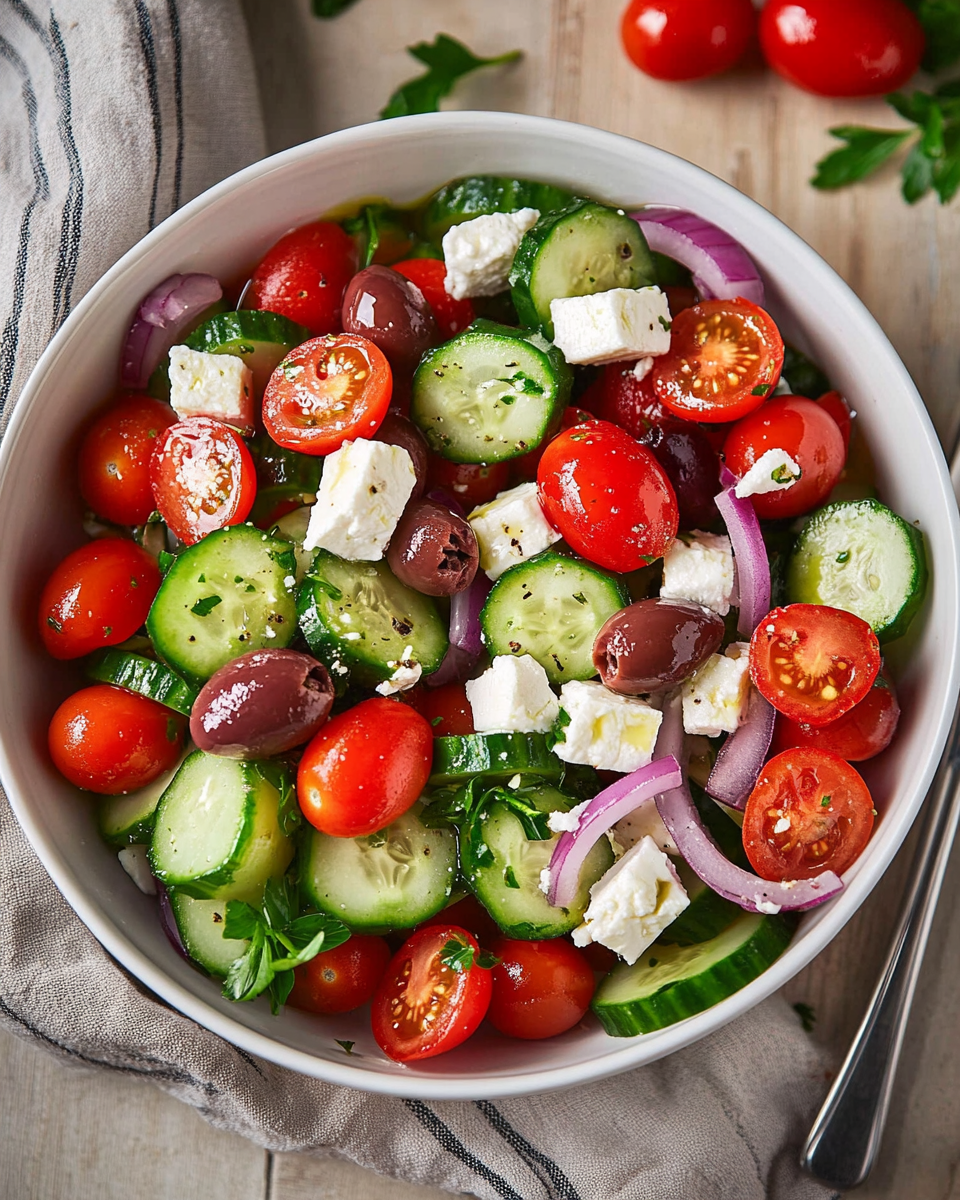This refreshing Greek Cucumber Salad combines crisp cucumbers, juicy tomatoes, briny olives, and creamy feta for a classic Mediterranean side dish.
FULL RECIPE
Ingredients
- 2 cups cucumber, thinly sliced
- 1 cup cherry tomatoes, halved
- 1/2 cup Kalamata olives, pitted and halved
- 1/4 cup red onion, thinly sliced
- 1/2 cup feta cheese, crumbled
- 2 tablespoons extra-virgin olive oil
- 1 tablespoon red wine vinegar
- 1 teaspoon dried oregano
- Salt and black pepper to taste
- Optional: fresh parsley for garnish
Directions
- In a large bowl, combine cucumber, cherry tomatoes, olives, and red onion.
- Drizzle with olive oil and red wine vinegar.
- Sprinkle with dried oregano, salt, and black pepper. Toss to combine.
- Gently fold in the crumbled feta cheese.
- Garnish with chopped fresh parsley if desired.
- Chill for 10–15 minutes before serving for best flavor.
Nutritional Information
- Calories: 190 kcal
- Protein: 4 g
- Total Fat: 16 g
- Saturated Fat: 4.5 g
- Cholesterol: 17 mg
- Carbohydrates: 7 g
- Fiber: 2 g
- Sugars: 3 g
- Sodium: 470 mg
- Potassium: 280 mg
History and Origins of Greek Cucumber Salad
Greek cucumber salad is deeply rooted in Mediterranean culinary traditions, particularly in Greece, where fresh, simple ingredients are celebrated. This salad reflects the Mediterranean diet’s emphasis on vegetables, olive oil, and fresh herbs, ingredients historically abundant in the region. Its origins trace back to ancient times when cucumbers, olives, and cheese were staples in Greek households. This dish has evolved over centuries but remains true to its rustic and wholesome beginnings, symbolizing the Mediterranean way of life.
Health Benefits of Greek Cucumber Salad
This salad is not only delicious but also highly nutritious. Cucumbers provide hydration and are low in calories, making them excellent for weight management. Olives offer heart-healthy fats and antioxidants, while feta cheese provides protein and calcium. The olive oil dressing contributes monounsaturated fats, known to support cardiovascular health. Combined, these ingredients help reduce inflammation and promote overall well-being, aligning with the healthful Mediterranean diet.
Role of Olive Oil in Mediterranean Cuisine
Olive oil is often called “liquid gold” in Mediterranean cooking, and it’s a cornerstone of this Greek cucumber salad. Its rich flavor enhances the freshness of the vegetables while adding healthy fats that aid in nutrient absorption. Olive oil is prized for its antioxidants and anti-inflammatory properties, which contribute to its reputation as a heart-healthy fat. Using extra-virgin olive oil in the salad ensures maximum flavor and nutritional benefits.
Why Cucumbers Are Ideal for Salads
Cucumbers are crisp, refreshing, and mild in flavor, which makes them an excellent base for salads. They have a high water content, helping to keep the body hydrated, especially in warm climates. Their subtle taste allows them to pair well with more assertive ingredients like olives and feta cheese. Additionally, cucumbers contain vitamins such as vitamin K and antioxidants that support skin health and digestion.
The Significance of Kalamata Olives
Kalamata olives, used in this salad, are a specialty from the Kalamata region in Greece. Known for their deep purple color and rich, tangy flavor, they add a distinctive briny contrast to the fresh cucumbers and tomatoes. These olives are also rich in healthy fats and antioxidants. Their inclusion in the salad not only boosts flavor complexity but also provides a taste of authentic Greek cuisine.
Feta Cheese: Tradition and Flavor
Feta cheese is a traditional Greek cheese made from sheep’s milk or a mix of sheep and goat milk. It is crumbly and tangy, offering a savory contrast to the sweet cucumbers and tomatoes. Feta adds both texture and flavor depth to the salad, making it more satisfying and nutritious. Its high calcium and protein content contribute to the salad’s health benefits, supporting bone strength and muscle maintenance.
Cultural Importance of Salads in Greek Meals
In Greek culture, salads are more than just side dishes; they are a vital part of the meal experience. Meals often emphasize fresh, seasonal ingredients served simply to highlight natural flavors. Greek cucumber salad is typically enjoyed alongside grilled meats, seafood, or as a light lunch on its own. It reflects the Greek philosophy of eating whole foods in balance and enjoying food as a social and communal activity.
Variations and Regional Twists
While the basic Greek cucumber salad recipe is simple, many regions and households add their unique touches. Some versions include bell peppers, capers, or fresh herbs like dill and mint for added aroma. Others may substitute the vinegar dressing with lemon juice for a brighter citrus note. These variations demonstrate the versatility of the salad and how it adapts to local tastes while maintaining its core identity.
Pairing Greek Cucumber Salad with Other Dishes
Greek cucumber salad pairs beautifully with a variety of meals. It complements grilled dishes such as souvlaki or roasted lamb, balancing rich flavors with its crisp freshness. It also works well as a side for seafood or with pita bread and hummus for a complete Mediterranean-inspired meal. Its light nature makes it ideal for summer barbecues or as part of a mezze platter.
Tips for Making the Best Greek Cucumber Salad
To make the best Greek cucumber salad, choose fresh and firm cucumbers and ripe tomatoes for maximum flavor. Use high-quality extra-virgin olive oil and authentic Kalamata olives to enhance authenticity. Allowing the salad to rest for a few minutes before serving lets the flavors meld beautifully. Avoid over-salting, as feta and olives already add significant saltiness. Fresh herbs like oregano should be added last for the best aroma.
Storing and Serving Suggestions
Greek cucumber salad is best served fresh to enjoy its crisp textures. However, it can be refrigerated for a few hours if prepared in advance. To prevent the salad from becoming soggy, it’s advisable to store the dressing separately and toss just before serving. This salad is perfect chilled and can also be served at room temperature. It makes an excellent light lunch or a refreshing side dish for dinner.
Sustainability and Sourcing Ingredients
Many ingredients in Greek cucumber salad can be sourced locally and sustainably. Choosing organic cucumbers and tomatoes reduces exposure to pesticides. Olive oil production in Mediterranean countries often supports traditional farming methods, which can be environmentally friendly. Selecting cheeses from local or ethical producers also helps promote sustainability. Supporting these practices contributes to healthier eating and a healthier planet.
Conclusion
Greek cucumber salad is more than just a simple side dish; it is a vibrant expression of Mediterranean culture, health, and culinary tradition. Its combination of fresh vegetables, quality olive oil, olives, and feta cheese creates a dish that is both flavorful and nutritious. Whether enjoyed as part of a family meal or a casual gathering, this salad embodies the principles of wholesome, balanced eating. Its versatility and ease of preparation make it a timeless favorite that continues to inspire healthy eating worldwide.






